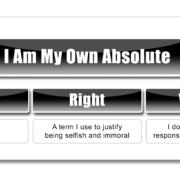A Time to Speak

I’m seeing several posts coming from well meaning people saying that we need to just love everybody and avoid any kind of confrontation.
Last year, President Trump narrowly missed being assassinated. This after several years of his opponents calling him a Nazi, a fascist, and a threat to democracy.
We need to just pray and not argue…
Where in Scripture does God tell us to be quiet and remain in our prayer closet while everyone else is voting, debating, knocking on doors, and basically pushing back against the narrative that says there is no absolute save the person who stares back at you in the mirror every morning?
This is the time to speak!
Here’s what I see:
First of all, to process Christ’s approach to the cross as our template for the way we confront evil is to forget that Jesus at one point said,
Every day I was with you in the temple courts, and you did not lay a hand on me. But this is your hour—when darkness reigns. (Lk 22:53).
Jesus’ willingness to be crucified was not meant to be an example for the way we resist evil and fight back against corruption. He had to go to the cross in order for the Scriptures to be fulfilled and to pay our debt (Matt 26:54). While there may be a time when Christ asks you to sacrifice yourself, simply laying down and doing nothing in the face of being attacked or not standing up for what’s right, believing that you’re an example of piety, is not an accurate interpretation of the whole of God’s Word.
John the Baptist wound up in prison for rightfully confronting the current administration and calling out Herod as being an immoral dirtbag. Jesus said that no human being was greater than John (Matt 11:9-11; Lk 3:19-20).
How many times in the Old Testament did a prophet confront a king or an entire nation and tell them that they were godless and offensive in the sight of God? Was Nathan vague in the way he spoke to David (2 Sam 12:7)? Did Elisha mince words when he told the king of Israel what was going to happen to him and his wife as a result of doing evil in the sight of God (1 Kings 21:21-24)?
Did David give Goliath a brochure? Did Paul try to be extra sensitive when he spoke to King Agrippa (Acts 26:24-29)?
There’s a difference between righteous indignation and the kind of rage that springs from thinking of no one other than yourself. Ephesians 4:26 says to not let your anger provoke you to the point where you do something wrong. That’s obviously something you want to avoid. Simply exchanging insults on social media is not accomplishing anything.
But at one point, David said…
Do I not hate those who hate you, and abhor those who are in rebellion against you? I have nothing but hatred for them; I count them my enemies. (Ps 139:21)
What David is saying is that he hates the work of sinners, and for good reason. Nothing good comes from those who intentionally try to do the wrong thing. And when you consider the pain and the problems that come from doing the wrong thing, you have every reason to detest that kind of mindset.
But, how do you respond to the “wrong thing?”
Have nothing to do with the fruitless deeds of darkness, but rather expose them. (Eph 5:11)
Expose them!
The person who doesn’t want to be “exposed” is not going to want to listen to you, nor do they want others to listen to you. They will be antagonistic and that kind of reaction is difficult to endure, which is why it’s so important to know what you believe and why you believe it so when it’s time to “expose them,” you sound like you have a point.
It also takes courage. For those who cringe at the thought of being criticized, it’s easy and convenient to retreat behind a biblical sounding excuse to not say or do anything.
That’s not discipleship, that’s cowardice.
What would’ve happened had our founding fathers not stood up to King George?
On one hand, they could’ve referred to Christ’s command to render to Caesar what is Caesar’s as well as the biblical admonishment to obey those in authority (Matt 22:21; Rom 13:1).
But rather than base their perspective on a mere portion of Scripture, they looked at God’s Word as a whole and were able to justify separating from England due to the fact that we are to obey God rather than man (Acts 5:29).
They stood up and they spoke out.
Your witness means very little if you smile at the things that send a person to hell and endorse the things that put Christ on the cross.
David didn’t just sing, Paul didn’t just write, and Jesus didn’t just pray.
There’s a time to be silent and there’s a time to speak.
This is the time to speak.









